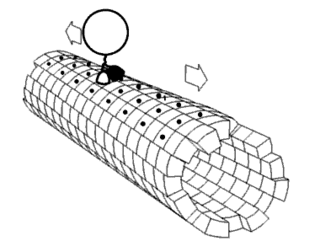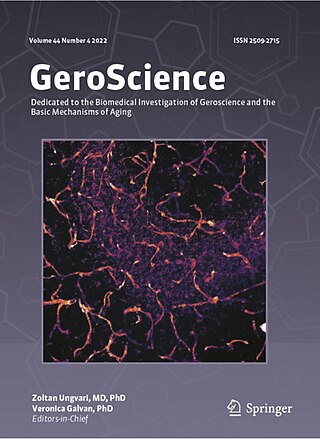
Biophysics is an interdisciplinary science that applies approaches and methods traditionally used in physics to study biological phenomena.Biophysics covers all scales of biological organization, from molecular to organismic and populations. Biophysical research shares significant overlap with biochemistry, molecular biology, physical chemistry, physiology, nanotechnology, bioengineering, computational biology, biomechanics, developmental biology and systems biology.

The SIB Swiss Institute of Bioinformatics is an academic not-for-profit foundation which federates bioinformatics activities throughout Switzerland.

The Max Planck Institute of Biochemistry is a research institute of the Max Planck Society located in Martinsried, a suburb of Munich. The institute was founded in 1973 by the merger of three formerly independent institutes: the Max Planck Institute of Biochemistry, the Max Planck Institute of Protein and Leather Research, and the Max Planck Institute of Cell Chemistry.

The Max Planck Institute for Biophysical Chemistry, also known as the Karl-Friedrich Bonhoeffer Institute, was a research institute of the Max Planck Society, located in Göttingen, Germany. On January 1, 2022, the institute merged with the Max Planck Institute for Experimental Medicine in Göttingen to form the Max Planck Institute for Multidisciplinary Sciences.

Peter B. Moore is Sterling Professor emeritus of Chemistry, Professor of Molecular Biophysics and Biochemistry at Yale University. He has dedicated his entire career to understanding the structure, function, and mechanism of the ribosome.
The Federação das Sociedades de Biologia Experimental is a Brazilian scientific association which runs a number of the mainstream specialized societies in experimental biology and medicine. It was founded in 1985 and currently has the following member societies:
The Biochemical Society is a learned society in the United Kingdom in the field of biochemistry, including all the cellular and molecular biosciences. It was founded in 1911 and acquired the existing Biochemical Journal the following year. The society additionally publishes the journals Clinical Science and Biochemical Society Transactions via its publishing arm, Portland Press. It awards the Colworth Medal and formerly awarded the CIBA Medal. As of 2024, the president is Julia Goodfellow.

Marianne Grunberg-Manago was a Soviet-born French biochemist. Her work helped make possible key discoveries about the nature of the genetic code. Grunberg-Manago was the first woman to lead the International Union of Biochemistry and the 400-year-old French Academy of Sciences.

The American Society for Biochemistry and Molecular Biology (ASBMB) is a learned society that was founded on December 26, 1906, at a meeting organized by John Jacob Abel. The roots of the society were in the American Physiological Society, which had been formed some 20 years earlier. ASBMB is the US member of the International Union of Biochemistry and Molecular Biology.

Ewald Rudolf Weibel HonFRMS was a Swiss anatomist and physiologist and former director of the Institute of Anatomy at the University of Bern. He was one of the first scientists to describe the endothelial organelles Weibel–Palade bodies, which are named after him and his Romanian-American colleague George Emil Palade. He was known for his work on the anatomy of gas exchange in lungs on multiple spatial scales using stereology.

GeroScience is a scientific journal focused on the biology of aging and on mechanistic studies using clinically relevant models of aging and chronic age-related diseases. The journal also publishes articles on health-related aspects of human aging, including biomarkers of aging, multisystem physiology of aging and pathophysiology of age-related diseases.

Research at the Biozentrum of the University of Basel is dedicated to the central question of how molecules and cells create life − from atom to organism, and from the physics of life to the dynamics of multicellular systems. Accordingly, the scientists at the Biozentrum are active in a wide range of research fields. These disciplines are not strictly separated from each other, but often overlap, thus leading to new questions and collaborations.

Erich Nigg is a Swiss cell biologist.
Susan M. Gasser is a Swiss molecular biologist. From 2004 to 2019 she was the director of the Friedrich Miescher Institute for Biomedical Research in Basel, Switzerland, where she also led a research group from 2004 until 2021. She was in parallel professor of molecular biology at the University of Basel until April 2021. Since January 2021, Susan Gasser is director of the ISREC Foundation, which supports translational cancer research. She is also professor invité at the University of Lausanne in the department of fundamental microbiology. She is an expert in quantitative biology and studies epigenetic inheritance and genome stability. Recipient of multiple swiss and European awards, she was named member of the US Academy of Sciences in 2022.

Françoise Gisou van der Goot is a Swiss-Dutch cell biologist. She is a professor and the Vice President for Responsible Transformation at EPFL.
Paul-Émile Pilet,, was a Swiss biologist, professor and director of the Institute of Plant Biology and Physiology of the University of Lausanne.

Beat Fierz is a Swiss chemist and molecular biologist, currently an Associate Professor at the EPFL. His research is focused on understanding dynamic processes of large molecular systems, particularly in chromatin regulation.

Paola Picotti is an Italian biochemist who is Professor for Molecular Systems Biology at ETH Zürich. She is Deputy Head of the Institute for Molecular Systems Biology. Her research investigates how the conformational changes of proteins impact molecular networks with cells. She received numerous awarded awards, among which the 2019 EMBO Gold Medal.
Geneviève Défago is a former lecturer in phytopathology at the Institute of Plant Sciences in the discipline of phytomedicine at ETH Zurich, the Swiss Federal Institute of Technology in Zurich, Switzerland. She was the director of interuniversity and interdisciplinary projects devoted to biological control and biosafety. In 1990, she was awarded the title of Professor. She retired at the end of July 2006.













